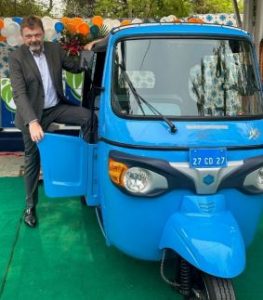The National Solar Energy Federation of India (NSEFI) recently unveiled Delhi’s first Grid Connected Solar-Powered EV Charging Station at Hauz Khas Village Parking Station.
The EV Charging Station was inaugurated by Dr. Philipp Ackermann, German Ambassador to India and Bhutan in the presence of Amarjeet Singh, CEO, BSES Yamuna Power Limited, Raman Bhatia, Managing Director, Servotech Power Systems Limited, Chintan Shah, Principal Advisor, NSEFI and Subrahmanyam Pulipaka, CEO, NSEFI.
The pilot system has been developed within the framework of the KVP project of Sequa between the National Solar Energy Federation (NSEFI) and the Bundesverband Solarwirtschaft e.V (BSW), in cooperation with BSES and the Municipal Corporation of Delhi (MCD) installed by Servotech. This KVP project is supported by German Sequa GmbH as part of the Business Membership Organization Partnerships (KVP) of the Federal Ministry for Economic
Cooperation and Development (BMZ).
This PV Carport brings a business model to DISCOM and Business Operators seeking to replace last-mile delivery vehicles for goods and services with an electric fleet. The system allows for fast charging of two and four-wheelers in less than 1 hour while providing delivery services in inner city and confined spaces. The concept was conceptualized by NSEFI and BSES to demonstrate a model concept for solar net-metering combined with EV fast charging.
 His Excellency Dr. Philipp Ackermann, German Ambassador to India and Bhutan graced the event as the Chief Guest at the inauguration of the Solar-Powered EV Charging Station, to which he traveled in the German-sustainable RE-powered auto rikshaw. “In renewing the Green Sustainable Development Partnership (GSDP) this year, Germany and India continue their collaboration to enhance green mobility infrastructure. Initiatives like the newly inaugurated EV charging station in Delhi underscore our commitment to reducing carbon emissions and improving living conditions through sustainable technology,” he said.
His Excellency Dr. Philipp Ackermann, German Ambassador to India and Bhutan graced the event as the Chief Guest at the inauguration of the Solar-Powered EV Charging Station, to which he traveled in the German-sustainable RE-powered auto rikshaw. “In renewing the Green Sustainable Development Partnership (GSDP) this year, Germany and India continue their collaboration to enhance green mobility infrastructure. Initiatives like the newly inaugurated EV charging station in Delhi underscore our commitment to reducing carbon emissions and improving living conditions through sustainable technology,” he said.
NSEFI CEO Subrahmanyam Pulipaka mentioned that “India and Germany are natural partners when it comes to energy transition. Over the past year, we have intensified private-sector relations and exchanges between the associations as well as our members. Pilots like this stand as an example of our Joint resolve to decarbonize mobility along with electricity through solar”.
David Wedepohl, BSW MD of International Affairs added, “It is amazing to see how much is happening in the solar and energy storage sector in India at so many levels. We and our Indian partners keep learning from each other. That includes how common our challenges like the decarbonization of transport are. By providing a business model along with a technical proof of concept we hope to leverage investment of the private sector in such infrastructure”.